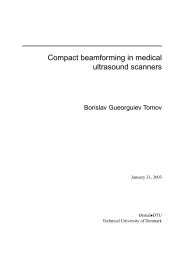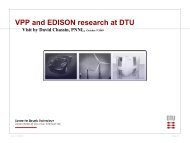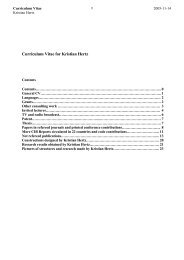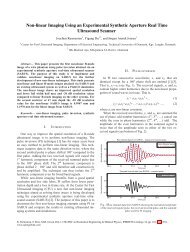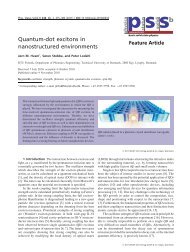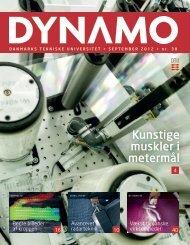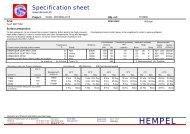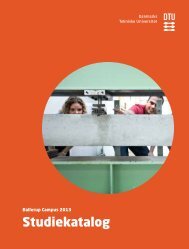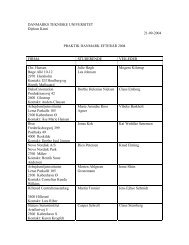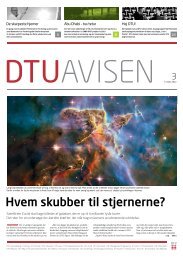Role of Intestinal Microbiota in Ulcerative Colitis
Role of Intestinal Microbiota in Ulcerative Colitis
Role of Intestinal Microbiota in Ulcerative Colitis
Create successful ePaper yourself
Turn your PDF publications into a flip-book with our unique Google optimized e-Paper software.
Discussion and conclusion<br />
162<br />
7. Discussion and perspectives<br />
The use <strong>of</strong> fecal samples to explore the colonic bacterial community <strong>in</strong> humans has been widely<br />
used, s<strong>in</strong>ce these samples are easy to collect without <strong>in</strong>vasive procedures compared to colonic<br />
biopsies (Takaishi et al., 2008;Sokol et al., 2009;Q<strong>in</strong> et al., 2010;Larsen et al., 2010). Nevertheless,<br />
the fecal microbiota may not be representative for the colonic mucosal microbiota, given that<br />
literature has revealed that the two microbiota communities differ from that <strong>of</strong> the others<br />
(Zoetendal et al., 2002;Eckburg et al., 2005;Turroni et al., 2009). In view <strong>of</strong> exam<strong>in</strong><strong>in</strong>g <strong>in</strong>volvement<br />
<strong>of</strong> the <strong>in</strong>test<strong>in</strong>al microbiota <strong>in</strong> UC pathogenesis, the mucosal microbiota could be more relevant to<br />
study, due to their closer <strong>in</strong>teraction with the epithelium (Derrien et al., 2011;Van den Abbeele et<br />
al., 2011b). However, ow<strong>in</strong>g to sampl<strong>in</strong>g restrictions, feces were analyzed <strong>in</strong> paper 1 to compare<br />
microbiota derived from healthy subjects and UC patients.<br />
7.2. Modulation <strong>of</strong> the fecal microbial community from UC patients<br />
Bifidobacteria and lactobacilli are believed to play an important role <strong>in</strong> promot<strong>in</strong>g <strong>in</strong>test<strong>in</strong>al health<br />
and species <strong>of</strong> both genera have shown to <strong>of</strong>fer anti‐<strong>in</strong>flammatory effects by down‐regulation <strong>of</strong><br />
pro‐<strong>in</strong>flammatory cytok<strong>in</strong>es and <strong>in</strong>duction <strong>of</strong> Treg cells (Hoarau et al., 2006;Peran et al.,<br />
2007;Ghadimi et al., 2010). A reduced level <strong>of</strong> lactobacilli and bifidobacteria could compromise the<br />
colon health and favor <strong>in</strong>test<strong>in</strong>al <strong>in</strong>flammation. Hence selective stimulation <strong>of</strong> lactic acid bacteria<br />
by prebiotics could be an approach to help decrease risk <strong>of</strong> flare‐ups <strong>in</strong> UC patients. In Paper 3,<br />
fermentation‐<strong>in</strong>duced changes <strong>in</strong> fecal microbial communities obta<strong>in</strong>ed from either healthy<br />
subjects and UC patients <strong>in</strong> remission or relapse were <strong>in</strong>vestigated us<strong>in</strong>g arab<strong>in</strong>o‐oligosaccharides<br />
(AOS; DP2‐10) derived from sugar beet pulp. The potential prebiotic properties <strong>of</strong> AOS was<br />
compared to FOS (classified prebiotic (Rastall, 2007)). Incubation with AOS and FOS gave rise to<br />
selective stimulation <strong>of</strong> bifidobacteria and lactobacilli <strong>in</strong> fecal microbial communities derived from<br />
UC patients. The ability <strong>of</strong> Bifidobacterium spp. and Lactobacillus spp. to utilize AOS or FOS and<br />
compete for substrate could be ascribed the presence <strong>of</strong> GH such as α‐L‐arab<strong>in</strong><strong>of</strong>uranosidases (EC<br />
3.2.1.55), and/or fructan β‐(2,1)‐fructosidase (EC 3.2.1.153) <strong>in</strong> species <strong>of</strong> these genera<br />
(http://www.cazy.org/ and http://www.uniprot.org/uniprot/, 2011‐10‐11). No human trials or <strong>in</strong><br />
vivo studies have been reported exam<strong>in</strong><strong>in</strong>g the protective effect <strong>of</strong> AOS aga<strong>in</strong>st colitis. However,<br />
the protective effect <strong>of</strong> FOS has been demonstrated <strong>in</strong> animals with <strong>in</strong>duced colonic <strong>in</strong>flammation.<br />
The studies showed that consumption <strong>of</strong> FOS resulted <strong>in</strong> decreased severity <strong>of</strong> colonic damage<br />
and <strong>in</strong>creased amount <strong>of</strong> colonic lactobacilli and bifidobacteria (Cherbut et al., 2003;Lara‐



